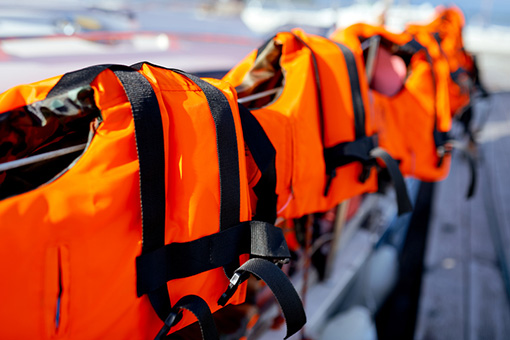As the days begin to warm, the boating season approaches. That means it's time to get your boat ready for the water. A thorough spring commissioning will give your vessel a (literal) smooth start to the season - and help prevent repairs down the line. Following a spring commissioning checklist will get your boat in its best shape for the fun days on the water ahead.
How to Prepare Your Boat for Spring
From prepping the engine to checking fuel systems and electrical components, here's everything you need to do before launching.
1. Prep the Engine
Your boat's engine is its heart, and after months of winter storage, it needs proper attention before hitting the water. The best way to prepare your boat for the season is to follow manufacturer-specific steps based on your engine type.
The exact process you follow to de-winterize any marine engine varies depending on the type of engine, the manufacturer, and the model. The biggest differences are between outboards, inboards, and stern drives:
- Inboard Engines: Reconnect hoses, inspect belts for wear, and check the cooling system. If your boat has a raw water system, flush it thoroughly before starting the engine.
- Outboard Engines: Reinstall the drain plug, check the fuel line for cracks, and inspect the propeller for damage. If needed, grease the fittings and change the lower unit oil.
- Stern Drive Engines: Examine the bellows for cracks or leaks, lubricate moving parts, and check the power steering and trim fluids.
For all engine types, run the engine on a flush system before heading out to confirm everything is working properly. Prepping the engine can vary quite a bit from engine model to engine model, so either make sure you have the owner's manual handy or consider taking the boat to a pro for its spring commissioning.
Learn More: Boat Motor Maintenance & Engine Care Guide
2. Check the Plumbing and Flush the System
Boats with freshwater systems, heads with holding tanks, sinks, and showers should have been treated with antifreeze in the fall. After sitting idle for months, water systems can develop blockages or leaks.
Now is the time to flush these hoses and lines with fresh water until you're sure all the antifreeze has been washed away.
- Inspect hoses and fittings for cracks or loose connections.
- Flush the freshwater system and test all faucets, showers, and sinks.
- If your boat has a head system, pump out and sanitize the holding tank.
- Check that the bilge pump runs smoothly and that the float switch operates properly.
Taking care of these steps now can prevent mid-season breakdowns and water system failures.
3. Check Batteries and Electrical Systems
Many people remove the batteries from the boat and put them on a maintenance charger over the winter, so they'll simply need to be put back into the boat with the leads properly connected.
Even if your batteries stay aboard, don't neglect to hook up a charger before you try launching the boat. A dead battery is one of the most common issues boaters experience at the start of the season. Before launching, make sure your boat's electrical system is fully operational.
- Inspect all batteries; they should be securely mounted, connected properly, and fully charged.
- If a battery is weak or won't hold a charge, replace it before heading out.
- Test all lights, pumps, and electronics, including navigation lights, bilge pumps, radios, and GPS systems.
- If needed, look for corrosion on terminals and clean connections with a wire brush.
4. Inspect the Fuel System for Leaks or Damage
Fuel-related issues are another common problem when preparing your boat for the season. Over time, fuel lines can become brittle, and small cracks can lead to dangerous leaks.
- Inspect all fuel hoses, tanks, and fittings for wear, corrosion, or damage.
- Look for cracked, dry, or soft fuel lines, and replace any that show signs of deterioration.
- Check that clamps and connections are secure and test the fuel vent to prevent blockages.
- If your boat was stored with fuel, add a fresh fuel stabilizer before running the engine.
For peace of mind, schedule regular fuel system inspections by a professional to keep everything running safely.
Learn more about preparing your boat for boating season:
5. Perform General Maintenance
Regular upkeep goes a long way in keeping your boat looking and performing its best. Spring commissioning is the perfect time to refresh your boat and protect it from the elements.
- Wash and wax the hull to remove dirt, oxidation, and buildup.
- Inspect vinyl seats, canvas covers, and upholstery for mold, tears, or fading; clean and treat with UV protectant as needed.
- Check for hull damage; if needed, consider painting or applying a protective coating.
- Clean the deck, non-skid surfaces, and compartments to prevent mildew and dirt accumulation.
Spending time on these small maintenance tasks now will keep your boat in great shape throughout the season.
Read Next: 10 Boat Storage Ideas to Help You Stay Organized Onboard
6. Review Your Boat Insurance Coverage
Before launching, it's also a good time to review your boat insurance policy. Accidents, breakdowns, and unexpected weather events can happen, and having the right coverage gives you peace of mind.
- Check that your policy is active and up to date.
- If you've made upgrades or modifications, confirm that your policy covers them.
- Consider additional coverage options, such as on-water towing or on-water assistance.
Having proper insurance means you can enjoy the season without worry, knowing you're protected no matter where your boating adventures take you.
Getting Your Boat Ready for The Season
With spring commissioning complete, it's time for the shake-down cruise: your first run of the season and a chance to catch any issues before they become bigger problems. A quick trip on the water can reveal anything from a weak battery to a minor leak, helping you avoid surprises when it really counts.
And while it's technically a "chore," after months off the water, feeling the boat glide beneath you and the sun on your face doesn't sound too bad. A little preparation now means more time to enjoy the season ahead.
This article and video are sponsored by Progressive Insurance®



